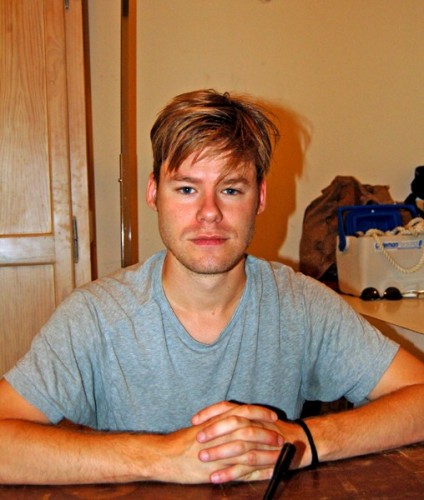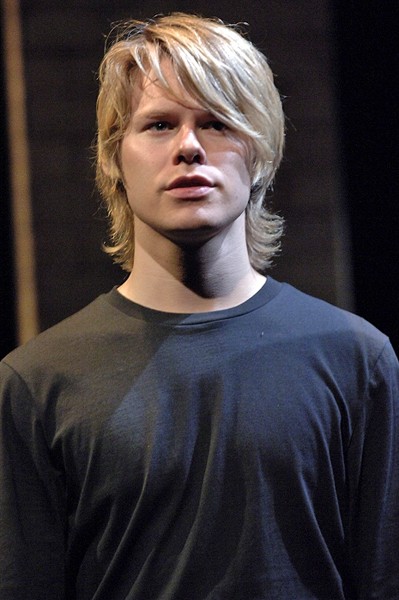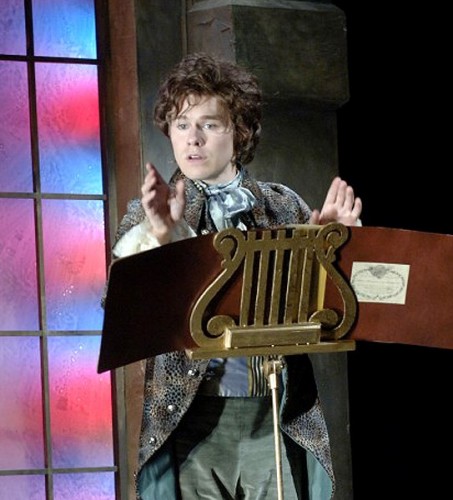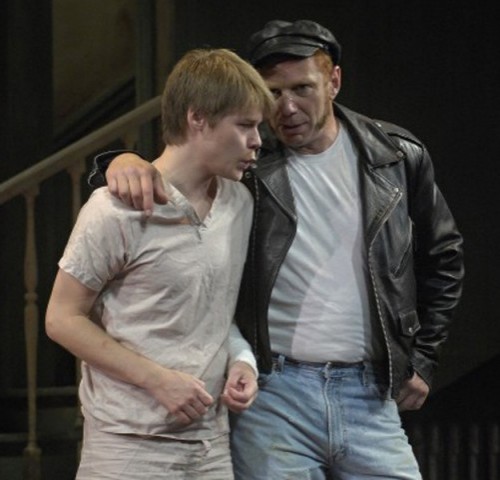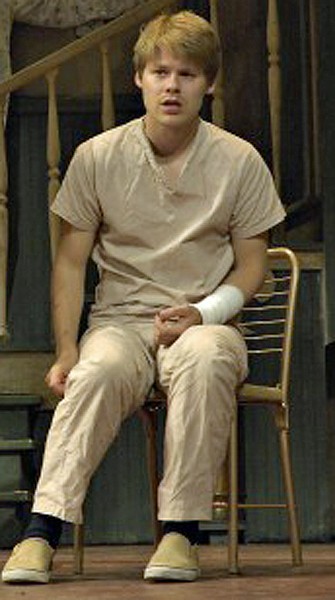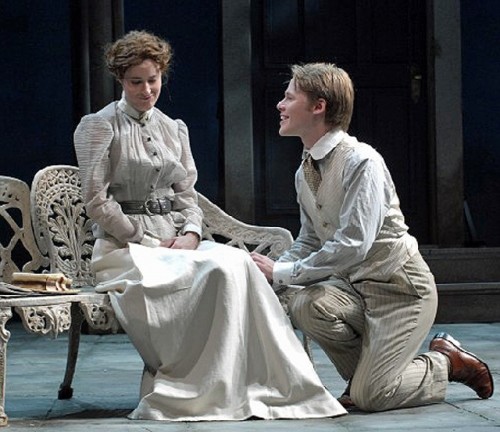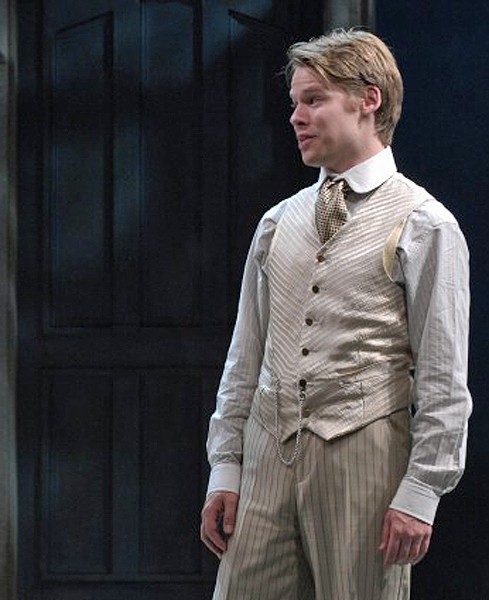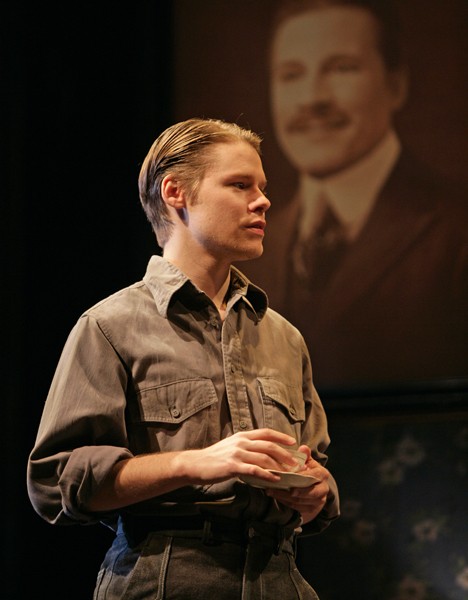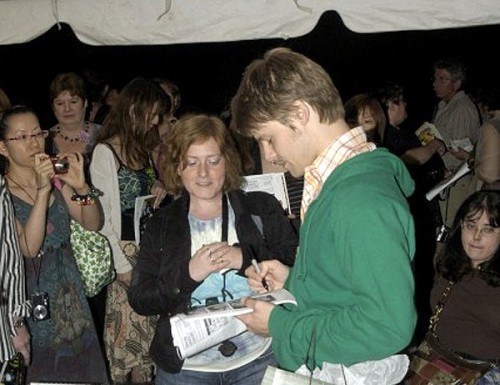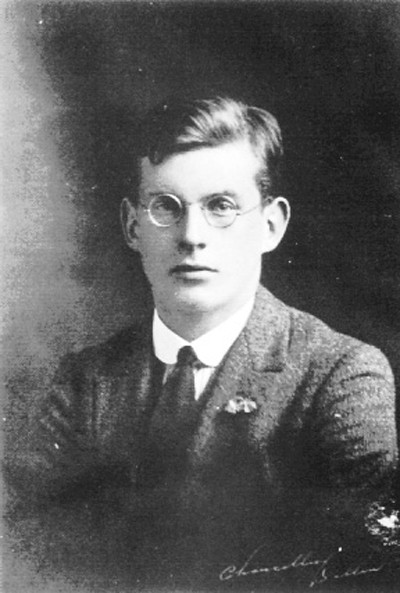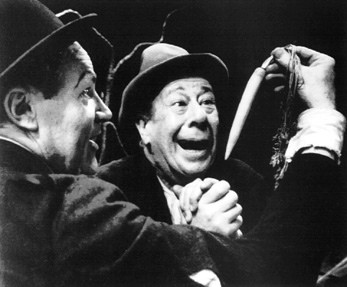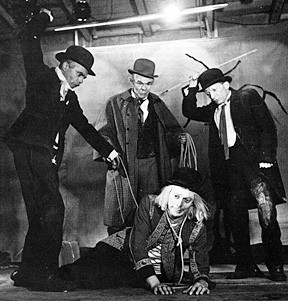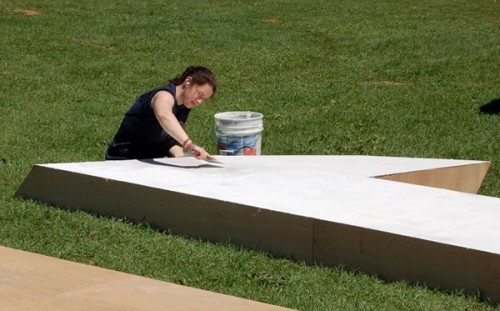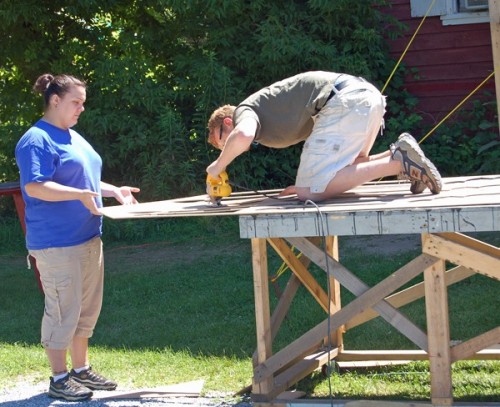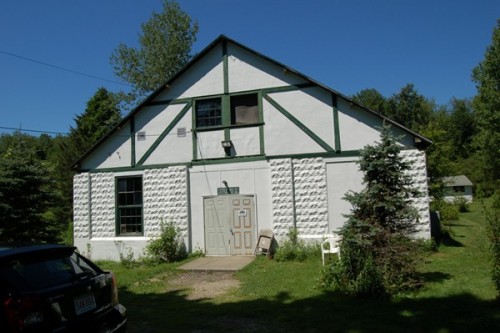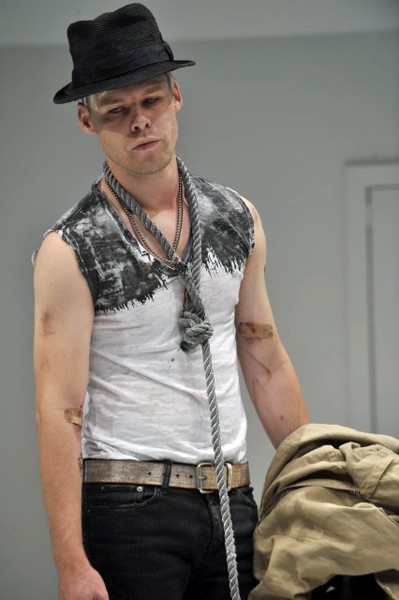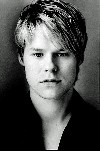Randy Harrison Talks About Waiting for Godot
Extended Rehearsals Underway at Berkshire Theatre Festival
By: Larry Murray - Jul 21, 2008
Samuel Beckett
Beckett's first major and successful play originally opened in a tiny space in Paris in 1953, and was as bewildering then as it is today. The Berkshire Theatre Festival performs Waiting for Godot from July 29 to August 23 in their smaller 122 seat Unicorn Theatre. There are less than 3,000 tickets available for the entire run, and it will be the hottest ticket of the Berkshire summer season.
What a strange yet familiar play Samuel Beckett wrote, so full of meaning for some, but to be honest, it also has its detractors. Those who prefer conventional plays often find it, as Vivian Mercier once summarized, "An evening of theater in which nothing happens, twice."
Perhaps that is because Beckett broke all the rules, and distilled the conventions of theater down to their minimum. The set is spare, plain, with nothing more than a bare tree beside a path. The plot is... well, there really isn't one. The action is simply two homeless tramps who while away their time waiting for the arrival of someone named Godot. There is little character or plot development. The most excitement is when Lucky and Pozzo appear to provide momentary diversions. It is as if you are sitting on a park bench, doing nothing more important than simply people watching. Endlessly fascinating, but what does it all mean? And does it have to mean anything? At least it passes the time.
Needless to say, those who have seen earlier productions of this enigma play will be back for another fix, hoping that maybe this production will provide some new insights and answers to the lingering questions. But Waiting for Godot is always the same, there are few answers, just lingering questions. Sure there is lots of humor, a little vaudeville, and some dramatic tension, even the suggestion of suicide. And a vague feeling that the solution to all the questions may finally arrive.
Randy Harrison
Having been bitten, bad, by the Beckett bug, I turned to actor Randy Harrison for help in understanding Godot. This fine actor has been performing since age seven, and found early success and fame soon after finishing college, playing the character Justin in the Showtime series Queer as Folk. The series lasted five seasons and 82 episodes and typecast him in many people's minds.
But he has been hard at work in live theater, earning his chops, by taking on roles that will let him further develop his craft. This is the fourth summer he has worked with the Berkshire Theatre Festival. His role as Lucky in Waiting for Godot is about as against type as this actor can get. We spoke with Harrison about the upcoming production which is now in rehearsal. It plays July 29 to August 23.
Note: Since this appeared, there has been a second interview, in August 2009 anticipating his appearance at the Berkshire Theatre Festival, in the classic Ghosts by Henrik Ibsen.
The Interview
LM: Glad to see you back in the Berkshires. How are the rehearsals going?
RH: I've been here for four summers now, and I love it. I feel so lucky to be able to spend time here.
We've had rehearsals underway for two and a half weeks now. I never worked on Beckett before. I love Beckett, so I was really excited to have the opportunity to work on a Beckett play.
LM: Did you bring any Beckett baggage with you?
RH: Nothing much beyond a love of it.
LM: The play can be a daunting challenge.
RH: I didn't feel scared really, I just felt really, really excited about it. There's so much academic stuff, so much to study and think about it, and I just tried to scrape it all away and start fresh.
LM: They say that Bert Lahr (who was in the original Waiting for Godot) didn't understand a line of what he was saying.
RH: I don't think you necessary need to. I just tried to be with the director (Anders Cato) and the script as I see it. It grows for me, and I think for all of us, every time we say it out loud. I worked with Anders last year on Mrs. Warren's Profession and it is great to have him at the helm again.
LM: So how did it come to be that you got Lucky?
RH: One day Kate Maguire just asked me on the phone. And I knew she had been thinking about doing it. She just loves Beckett and she managed to get a grant for some extra rehearsal time.
LM: The NEA (National Endowment for the Arts) Grant is a precious gift of much needed development time for the production.
RH: It is just amazing, and we really need it. I am sure we could have put it up faster, like on a normal schedule, but it is so helpful to have the extra time. We're never rushing. We can talk about every moment of the script. The depth of the play expands over time, I think.
So much of Beckett is like living in a different world as a group. So to inhabit this bizarre and fascinating place together, and to have the time to explore it has really helped us as artists.
LM: Have you thought much about Lucky's character? How are you approaching the role?
RH: You know the first thing I did was to memorize that speech, (the famous five minute rapidly spoken monologue) just getting through that, you know, and then a lot of the physical stuff. I mean it has been growing a lot during rehearsal. I needed to get up and hold all those bags, see what it felt like to be burdened like that, to have a noose around my neck, to have David Schramm calling me "pig" and "hog". To just be there and figure it all out organically. The line readings then grow out of the situations.
LM: In some ways there is more information about the character of Lucky than any of the others in Godot.
RH: The characters talk about him a lot more, like his drooling...
LM I was thinking about his life as a slave, Pozzo complains: "He used to dance...He capered. For joy. Now that's the best he can do." There's even a line about being used up and tossed away like an old banana peel.
RH: Right, he has been exhausted.
LM: So, are you off-book yet?
RH: Pretty much. I just stuffed the last ten lines into my head last night. We'll see how they stick. Takes a while, so much of it is rhythm and repetition. And to hear myself do it a few times out loud before I feel confident.
LM: Have you looked up some of the unusual words like apathia, aphasia and athambia?
RH: Ah, yes. Apathy, uncaring, can't hear and unaffected, indifferent. We have a terrific dramaturg here, Jim (James Leverett) has given us all so much information and been really helpful.
LM: One analysis I read about Lucky is that he is a metaphor for Christ.
RH: I've heard that. It's interesting how much people think about it. Another take on it is that Lucky was intended to be about Ireland, and Pozzo was England. But my initial read on it was that it is more of a class thing. But it is all of those things. It is many layers and it is just simply what it is. You follow the script, and the audience will project what is a personal meaning for them, now they will see it. The problem is that while it is all of those things, you can only pick one to play.
LM: Are there any other Beckett works you would like to do?
RH: So many. I'd like to do all of them. I love Play, Endgame, Krupp's Last Tape. But I probably won't do Beckett again for a while. I am lucky to be able to play Beckett right now. You must be older, ideally, to do all of it.
LM: So this is the fourth or fifth role you have played at Berkshire Theatre Festival. Alan Strang in Equus, Mozart in Amadeus, Billy Bibbitt in One Flew Over the Cuckoos Nest, and Frank Gardner in Mrs. Warren's Profession are the ones I remember. Are there other roles you would like to play?
RH: Haven't thought about it in a while. I used to have this huge list but I know I would like to play Tom again in Glass Menagerie.
LM: Let's talk about that for a moment. That earlier production at the Guthrie in Minneapolis was unusual in that it had two Toms, an older narrater one, and a younger one who was the son. Since you were the young Tom, you didn't get to make the famous closing balcony speech.
RH: And I certainly hope to someday be able to make those narrative speeches. It was a really interesting project, totally different from the standard. We had to work together for each of us to play half of the same role, and make sure we were working in unison to create the picture of a single character for the audience. I think it worked for the audience, but it was frus...hard for us to really gauge, because we didn't get the full arc of what was really intended.
LM: I didn't see the production, but it is much discussed. Were you both on stage at the same time?
RH: Yes, we were often on stage together. He would describe me as I stood there. We did initially have some dialogue together, but I think that ended up being cut. But he was describing me, and himself as I stood there.
LM: One of the things that is striking about your career is that you had quite a bit of training in musical theatre, but you seem to have drifted to more dramatic roles. Certainly there are plenty of challenges in straight theatre, but how about music, is that still on your to-do list?
RH: I love music, but by the time I graduated from theatre school - Cincinnati College Conservatory of Music (CCM) - I knew I wouldn't be satisfied doing just music. I love - even adore - some of what is being done in musical theatre but I don't necessarily like everything that is being done these days. Sure I worked and made money, but I also felt unsatisfied somehow.
LM: You did a stint as Boq in Wicked on Broadway.
RH: Right. And I loved doing it. But I felt it shouldn't be forever.
LM: There are some videos of your performance in Wicked online, one taken from the mezzanine and one from the balcony.
RH: Isn't that illegal, violate copyright rules?
LM: Of course. They won't be up for long, I'm sure. Legality aside, thanks to YouTube, you can see bits and pieces of great performers and performances that otherwise would never be in public circulation....Piaf, Merman, Jolson.
Let's turn to your earlier years. What happened to the daring fellow who did a production of a Mark Ravenhill play in college? Why aren't his works produced more often?
RH: Oh you mean Shopping and Fucking? I imagine audiences and producers are afraid of it. I also wonder why Sarah Kane (a brilliant but bold British playwright who died before the age of 30 in 1999) isn't represented more, though getting rights to her work is as difficult as Beckett once was. They are doing, let me think, not Phaedra's Love but her first play (Blasted) at the Ohio in New York.
LM: Some people thought Ravenhill would emerge in ten years as the "new" Beckett.
RH: But it seems that Kane is emerging as the voice of that period. I have seen three different productions of her plays. I have been seeing a lot of French theater lately, and have been interested in more contemporary French writers who haven't been produced in the states, or translated into English.
LM: Like who?
RH: Bernard-Marie Koltès. I've seen a bunch of his work recently. And I have a bunch of friends in who have companies in New York who are doing new work as well. The Debate Society are friends of mine who do fascinating new work. The Nature Theatre of Oklahoma who had a big show at the Ohio this year called No Dice and are touring all over Europe.
LM: And the SITI Company, aren't they doing interesting things?
RH: They have a Radio Macbeth and then I think they may be doing The Seagull.
LM: They have something in the works in the American Museum Cycle about the Berkshire's own Norman Rockwell, called Under Construction.
RH: I am interested in how they are going to approach that. He was a great artist.
LM: New plays are often difficult at first. Here's a copy of the original 1956 review of Godot by Brooks Atkinson in the New York Times. He too found it puzzling though I think he suspected it was going to be an important work.
Let's get back to your role, have you found that Lucky's speech is full of musical cadences? When I read it aloud I found it had a beat.
RH: It is the music of it that makes it possible to memorize it. I don't use the device intentionally, but especially near the end, where there is less logic, that can be assigned to it, in order to keep it memorized, I find the rhythm and the tone propels me forward and I find myself continuing to speak even when I am not sure what's coming and it is the music of it, the rhythm of it.
LM: It is quite a tour de force.
RH: It's beautiful. It's just gorgeous. And it's powerful in a way that is not intellectual. You can't explain exactly why. Even when the words don't string together in a sentence that quite comes to a conclusion, there is so much power in just the way the words are assembled. It's amazing.
LM Since re-reading it I can't get the phrase "quaquaquaqua" out of my head.
RH: It apparently is based on a French word which means like facing in all directions. Not that anybody would know.
LM: One explanation I read was that it was based on a Latin word meaning therefore.
RH: Interesting. Pozzo uses qua beforehand, "qua sky" but I think it's meant differently.
There is this amazing workbook from the Berlin production that Beckett directed, I think it was in the late 70's. It has all of his notes on the show. It was an extraordinary and definitive production of Godot. Even he divides the speech up into four sections, it's really helpful.
LM: I noticed that it is the one speech in which he does not designate pauses, just one long speech with few breaks along the way.
RH: Even "Not I" has dot dot dot (ellipses) so you can know when to breathe.
LM: In some ways studying Beckett is like delving into Shakespeare's words.
RH: It is very similar in the way it expands when you speak it. You know, some things you get the logic of it, you understand the intention of the line and you say it, it and that's it, it doesn't go any deeper. With Shakespeare you find the more you speak it, the deeper and deeper it resonates within you. It's amazing.
LM: Ever feel sorry for Lucky, he never gets to put down those damned suitcases...
RH: He does when he dances. When he falls.
LM: ...and they are not full of sand.
RH: No. At least he is able to sleep. Some of the characters can't sleep. I'd love to be able to sleep everytime I hit the ground.
LM: Beckett's authorized biography was titled Damned to Fame, it is said that he despised notoriety, didn't like it very much. Do you relate to that at all?
RH: Of course, I would hate being famous.
LM: What else can be said about this production, what haven't we covered?
RH: I hope the audience finds it as amazing as I have. I haven't had to rehearse for a few days because they have been working on Act II before I enter, but we ran Act I last week and I just can't get over this play. The humanity in it just kills me. For example when the boy entered - it was the first time I saw the end of Act I - it just touched me so deeply. I find it so heartbreaking, but comforting, too. I find the humanity in it to be the most rewarding (aspect), there's no sentimentality. I don't find it...cynical. I think some people just think of it as being so bleak, but there is such humor and life and humanity in it.
LM: It faces the facts.
RH: Yeah. I feel like the fact that he honestly just faces the facts of the human existence, is what makes it so, so earned, the humor and everything.
LM: I took a couple of pictures of the set under construction, and it too looks pared down to its simplest possible form.
RH: Oh yeah?
LM: I tried to find the tree under construction, and see you have one here...
RH: A fake one. I'll have to walk over there and see how it is coming.
LM: It's a great day to do that. But you have a rehearsal soon, right?
RH: Exactly.
LM; Well, thank you for sharing your insights.
RH: You're welcome.
For tickets, use this link:
Quick Link to Berkshire Theatre Festival

